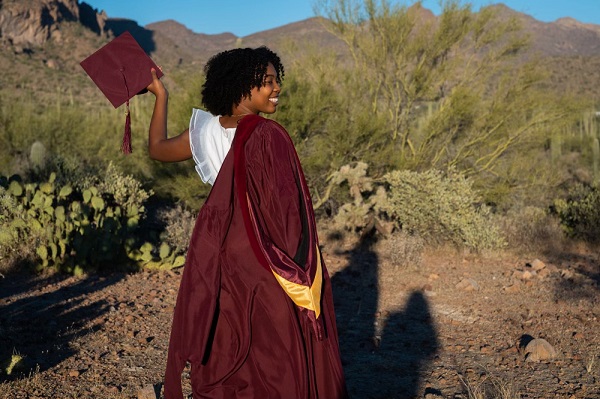ASU grad and Howard alum focused on nuanced journalism in communities of color
There’s no doubt about ASU being a school that cultivates dreams, but people should also know it helps students reaffirm dreams as well. Howard University alumna and New Orleans native Daja Henry graduated in December with her master’s degree in mass communications with a specialization in health reporting at the Walter Cronkite School of Journalism and Mass Communication.
While working two journalism internships and a job at McDonald’s, she was reminded and reignited by the importance of nuanced storytelling in communities of color. Henry wound up at the Cronkite school, drawn to their Robert Wood Johnson Foundation Southwest Health Reporting Initiative.

ASU grad Daja Henry
Henry had already committed to reciting narratives ordinarily excluded from the storybook. Her time at ASU taught her how to weave a tale for those who had never ventured into the lands the story speaks of.
“I had to take that sense of purpose that I already had and figure out how to apply it as an outsider looking into a community that was not my own,” she said.
Question: What was your “aha” moment, when you realized you wanted to study the field you majored in?
Answer: I had a busy summer after my freshman year studying journalism at Howard University. I worked two unpaid internships with the local Black-owned newspaper and a culture magazine. During nights and weekends, I worked at McDonald’s.
My time at McDonald’s made me realize what I wanted to do in journalism. The people I met there, people like me and from my neighborhood, are the people who are often excluded from the narratives. And if they are included, they are reduced to the worst moments of their lives. I realized I wanted to study journalism to tell our stories.
Q: What’s something you learned while at ASU — in the classroom or otherwise — that surprised you, that changed your perspective?
A: At ASU, I learned how to dig deeper into people’s stories to tell nuanced, complex stories. I had a multitude of experience through reporting on kids involved with the juvenile justice system for News21 and traveling to Panama to tell the stories of immigrants stuck there on their way to the United States. I had already known that’s what I wanted to do, but ASU forced me to look deeper and take it a step further.
Q: Why did you choose ASU?
A: I chose ASU and the Cronkite school specifically because I saw a great opportunity and responsibility to learn from the Latino and Native American communities through the Robert Wood Johnson Foundation Southwest Health Reporting Initiative.
I also saw the opportunity to learn from great professors who were career journalists and who cared immensely about the school and their students. I chose an education experience that I knew would cater to my needs and bring out my skills and talents.
Q: Which professor taught you the most important lesson while at ASU?
A: Rick Rodriguez taught me so many lessons. In taking his Borderlands class, I learned not only about immigration and beat reporting but about history, life and how to conquer any topic and any task.
Q: What’s the best piece of advice you’d give to those still in school?
A: To those still in school, I’d say to cherish the relationships you build in school, with both your peers and professors.
Q: What was your favorite spot on campus, whether for studying, meeting friends or just thinking about life?
A: I spent a lot of time in the First Amendment forum in the Cronkite building, talking to friends or just chilling and looking out of the huge windows.
Q: What are your plans after graduation?
A: I’m starting a job in Memphis, Tennessee, as a metro reporter for the Daily Memphian, a nonprofit publication.
Q: If someone gave you $40 million to solve one problem on our planet, what would you tackle?
A: If someone gave me $40 million to solve a problem, I’d invest in public infrastructure and minority communities to alleviate poverty but keep in mind that money isn’t the fix-all solution.